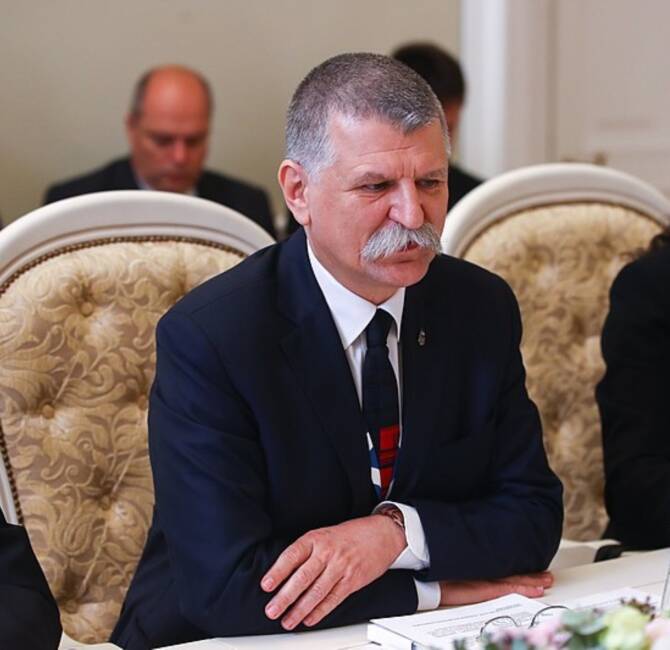This article was published online by the Magyar Nemzet on 15 February 2022.
On Monday, in the presence of enormous media interest and a few dozen peaceful protestors, Päivi Räsänen stood trial; she was sued for quoting the Bible and voicing the teachings of the Church. The former Interior Minister is accused by the Helsinki Attorney General of hate crimes against homosexuals in three public statements. One of these dates back to 2004. By citing a document prepared for religious use, the whole case appears to be more of a conceptual lawsuit than a procedure based on Finnish constitution and law.
Sympathizers protesting peacefully in support of Räsänen stood in front of the Helsinki District Court on Monday morning. The few dozen demonstrators had signs in various languages that wrote: “Päivi, we stand by you!”
A Finnish woman who had lived in Budapest for seven years held the Hungarian sign. She said that Räsänen should not be convicted because she expressed her religious views – this goes against Finnish values.
The accused arrived in the courtroom with her head held high, where she met with the press. She patiently answered all questions with a constant yet fragile smile. In answer to Magyar Nemzet’s question, Räsänen said:
“She feels calm and confident she will win the lawsuit.”
She said she regrets nothing and she will not take back any of her statements because everything she said was based on the Bible and her faith.
The politician will continue to stand up for freedom of expression and religion. No ruling will change that. She highlighted that
The Budapest demonstration on Sunday meant a lot to her; 3,000 people went to support her cause. She is extremely thankful for the Hungarian people.
The attorney general delivered her closing remarks first after the four-hour trial. Once again, similarly to her January speech in the trials, Anu Mantila detailed why she considers Räsänen’s statements a hate crime against homosexuals: her 2019 Tweets, in which she quoted the apostle Paul; her public radio discussion where she said that marriage is between a man and woman; and her religious pamphlet written in 2004 claiming that homosexual relations are contrary to God’s will.
According to the accusation, Räsänen cannot hide her hateful comments behind freedom of speech and religion; her religious beliefs should be kept to herself, this should not be public.
The attorney general believes that the state should intervene in every case of hate speech because if they stand against these groups, individuals will not be able to stand out alone. Even if for religious reasons, it is unacceptable to label homosexuals sinful; religious statements must also comply with legal requirements and non-discrimination.
According to the defense, hate speech includes intent or desire on the part of the perpetrator for violence and discrimination against the targeted group.
There is no sign of this in Räsänen’s statements. The attorney general attempted to put words in Räsänen’s mouth that she never uttered or wrote. The former Minister never referred to homosexuals with derogatory words, as Mantila claimed; in fact, the politician even consistently stressed that it was the sin she condemned, not those who committed it. A debate where one half continuously needs to fear going to court is not healthy. In response to the Tweet, (which actually was not directed at homosexuals but rather at her own Chruch which participated in the Pride parade) the lawyer said that Pride is a movement; thus, its very nature justifies its criticism, even if it is harsh.
According to lawyer Matti Sankamo, the prosecution’s clear intention is to restrict free speech.
In connection with the case, it is not as widely known that Räsänen was not the only one who ended up accused. Bishop Juhana Pohjola who published the 2004 article was also on the stand. This has no precedent in democratic Finland. During the trial, the bishop stated that these accusations are entirely baseless. Sexual education and its dissemination is in no way offensive or derogatory, he said in reference to the 2004 publication.
No verdicts were handed down on Monday because, at the prosecutor’s request, the public radio staff will also be heard on Thursday in connection with the 2019 broadcast. The prosecutor would like to delete both the show, which is available online, and the 2004 publication.
Päivi Räsänen left the courtroom with a sense of relief. She told our paper that to her it was clear that the accusations would not hold ground.
“If you follow the prosecution’s logic, then the state of freedom of religion in Finland would become the same as in China or North Korea.”
She added that her fate is in God’s hands, and everything will turn out as it should.
After the trial on Thursday, a verdict will be announced on March 30th.
Zoltán Bugnyár




